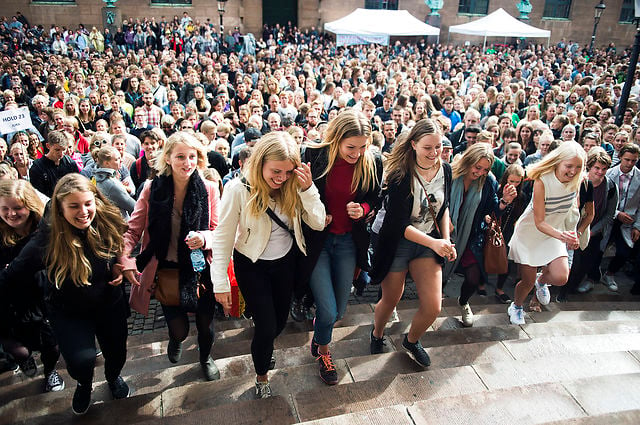EDUCATION
Number of Danes accepted into higher ed falls for first time in years
On Friday, 65,165 Danes had cause to celebrate after being informed that they had been accepted to a programme of higher education.
Published: 28 July 2017 14:46 CEST

Students file in to the University of Copenhagen on the first day of classes in September 2016. Photo: Ólafur Steinar Gestsson/Scanpix
For nearly every fourth person who applied to continue their education, however, Friday brought the news that they had not made the cut.
The 65,165 people accepted into higher education this year was 1,275 fewer than the year before. That two percent decrease broke a nearly decade-long streak of expanding student numbers at Danish universities. Not since 2008 has the number of accepted students gone down.
A total of 91,539 people sought admission to a higher education programme this year. Twenty-three percent of them, or 21,395 applicants, were not accepted. Those who did not get in were turned down either because of their grades or because they had not lived up to the specific programme’s acceptance criteria.
Søren Pind, the nation’s minister for higher education, said that the first decrease in accepted students in nine years was no cause for concern.
“It’s nothing that one should be worried about. On the contrary, we should celebrate the fact that young people appear to be focusing on where they can actually find jobs after [their education],” he told Politiken.
Pind pointed to the fact that IT and engineering programmes accepted more students this year than in 2016 while humanities and arts education programmes trimmed their number of new students.
Pind also said that this year’s decrease was inevitable.
“We’ve seen an enormous increase in the number of acceptances over the past several years and sooner or later – as a consequence of available funds and the discussions on the quality of the education institutions – it had to stop,” he said.
Bachelor programmes at Danish universities made up the majority of the new acceptances, at 44 percent. Vocational university colleges (professionshøjskolerne) were next at 40 percent followed by business academies (erhvervsakademierne) at 16 percent.
The number of students in Denmark’s higher education programmes has been a hot topic of debate for some time now. In January, the government backtracked on a controversial “education cap” that would have barred students from pursuing a second degree in an effort to free up some 300 million kroner in the state coffers.
In October 2015, thousands of students took to the streets to protest the Venstre-led government’s plans to cut the national education budget.
The cuts were suggested after two consecutive years of record new enrolment at Danish universities and a study that found that every fourth student in higher education programmes shows up to classes unprepared.
Url copied to clipboard!


 Please whitelist us to continue reading.
Please whitelist us to continue reading.
Member comments